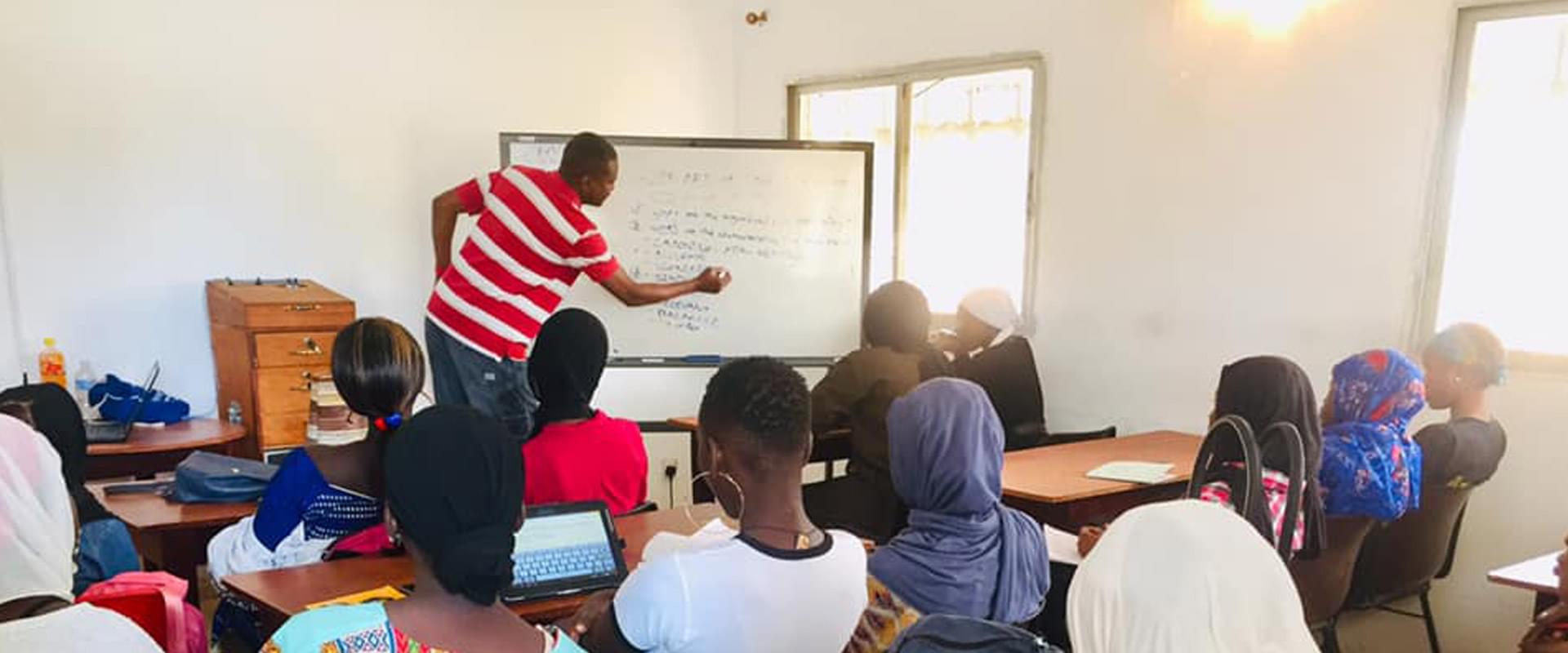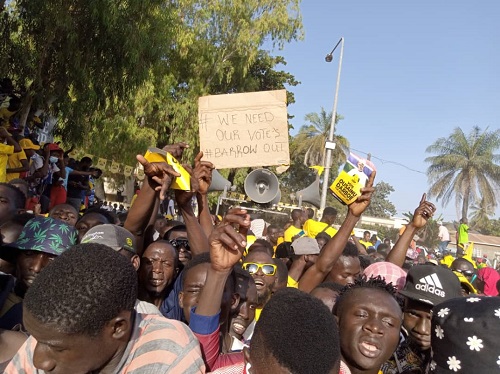
Dec 14, 2021 10:44 AM | Article By: Malick Nyang

Supporters of the United Democratic Party protesting December 4 presidential Election Results (Photo credit: Buba Gagigo)
The Gambia conducted a peaceful campaign and presidential election, but tolerance for political and ethnic diversity are the must-needed behaviours that can sustain tranquillity in the country.
The country went to polls on December 4, 2021 and the incumbent Adama Barrow has been declared the winner after amassing 53 percent of the total votes cast, beating his main challenger Ousainu Darboe, leader of the United Democratic Party (UDP), by more than 200, 000 votes.
However, a bit of controversy ensued the following day after the election as three opposition candidates from the UDP, Gambia Democratic Congress (GDC) and independent candidate Essa Fall called a joint press briefing in Fajara to reject the results without providing any evidence of malpractice. This created panic in the country as supporters of the UDP gathered in numbers at Darboe’s residence.
Faal though has since withdrawn stating that there were no sufficient grounds to claim against electoral fraud. The Police Intervention Unit was deployed to disperse the crowd using tear gas.
Youth and peace advocates have since been calling for political tolerance and respect for diversity. “For us to maintain the peace that we are known for in this country, we should be able to respect and accept diversity, and most importantly, promote unity at all times," Bakary Sonko, National Programmes Coordinator of Peace Hub – The Gambia, said.
He said everyone has the responsibility to maintain the peace of this country and everyone has the right to belong to any political party. However, citizens must respect laws, tolerate each other’s differences and exercise their franchise during the election and maintain peace afterwards.
Sonko believes that politicians are the right people to convince the masses to maintain peace, the primary role of politicians during and after the electoral periods is to advocate for peace alongside their manifestos.
“Political parties have a bigger role to play. They have the responsibility to counsel their party militants to support without any form of insult or negative stereotypes towards other groups,” he emphasised.
Jeopardised by politics
The Global Youth Parliament’s Regional Coordinator for West Coast Region, Kemo Fatty, said The Gambia's peaceful atmosphere must not be jeopardised by politics. He advised youth and women to be agents of peace and desist from all forms of violence.
“They must be engaged both day and night to ensure tranquillity in the electoral process,” he said.
Meanwhile, Fatou B.S. Badjie, Co-Founder of Girls in The Frontline for Development (GFD), said political leaders should always prioritise peace dialogues at all their fora.
She said women groups should be involved in the implementation of peace initiatives at community levels. GFD is built on advocacy pillars such as peacebuilding, prevention of violence, and tackling gender-based violence.
“We all have our fundamental human rights in which you have the right to assemble, the right to belong to any political party... So, we should understand that politics is not here to divide us, instead, it gives the platform to express divergent views that would help the country to grow,” Badjie explained.
In as much as everybody has the right to support a candidate or a party, Badjie said everyone must also be committed to promoting peace and that must start at individual level.
“Peace has to start with oneself. If you are not peaceful, you cannot help others to maintain peace. One has to understand how important peace is to ourselves, and then we will know how important it is to the entire nation," she said.
The Gambia is still a fledgling democracy, which is struggling to break from its brutal past, and does not seek a repeat of the 2016/2017 crisis, which saw thousands of citizens fled to neighbouring Senegal to seek refuge following a disputed election.
Although two opposition parties contest the results, all the international observers including five former African presidents and local observers have described the outcome as free and fair.
The Gambia’s three-year election cycle continues in April 2022 with a parliamentary election in which 53 seats are up for grab and in March 2023 with a local government election in which 2 mayoral and 5 chairperson seats are up for grab. Therefore, the advocacy for diversity, tolerance and peace remains highly needed in the country’s political discourse ahead of these crucial votes.
Comments (0)
6 Likes
Leave your thought here
Your email address will not be published. Required fields are marked *